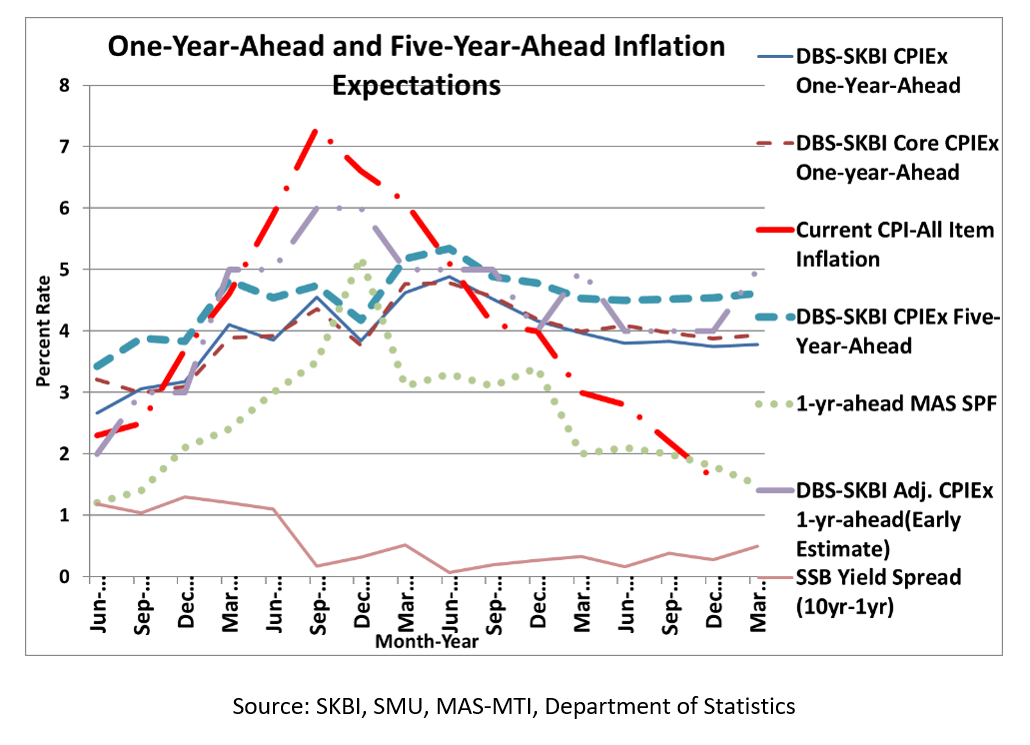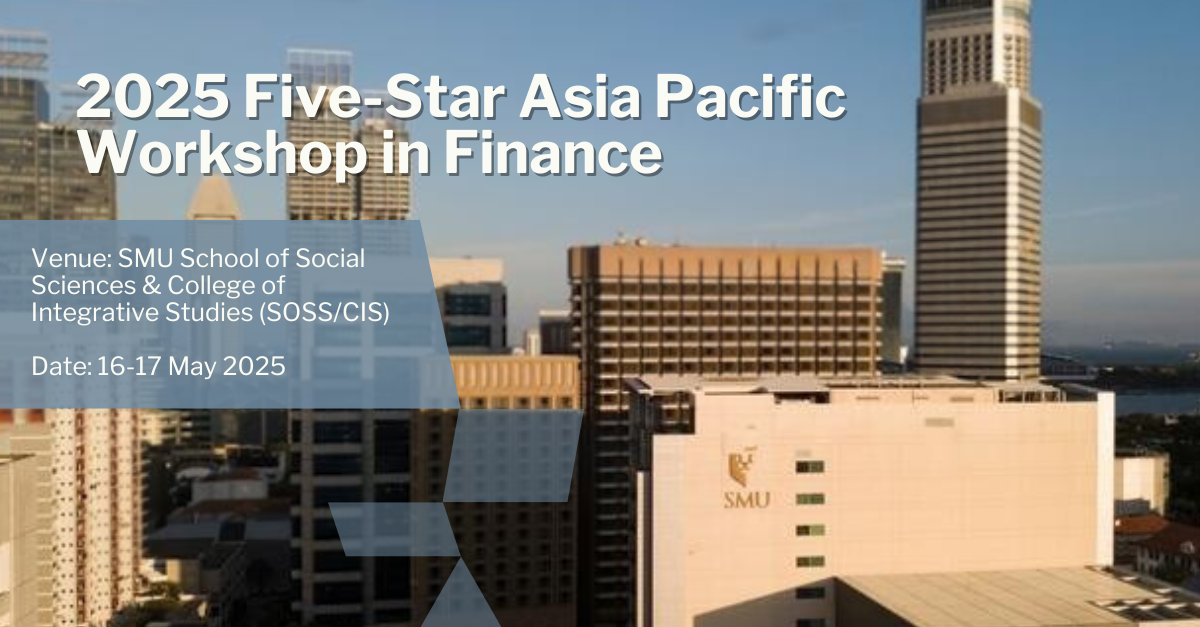SINGAPORE, 22 April 2025 (Tuesday) - These are the research findings of the 55th round of the DBS-SKBI Singapore Index of Inflation Expectations (SInDEx) Survey at the Sim Kee Boon Institute for Financial Economics (SKBI), Singapore Management University (SMU) conducted between 24 and 30 March 2025.

DBS Bank Chief Economist and Managing Director of Group Research, Dr Taimur Baig commented, “A US-induced trade shock is creating upward risk to inflation in the US and disinflation risk in the rest of the world. Prices of goods and commodities outside the US would likely ease as global supply adjusts to the US tariff moat. Inflation expectations in Singapore, already flat, are likely to ease, comforted by easing monetary policy and the steady decline in headline inflation since mid-2024.” Dr Aurobindo Ghosh, Assistant Professor of Finance at Singapore Management University (SMU), the creator and the founding Principal Investigator of the Quarterly DBS-SKBI SInDEx Project, observed, “The global order is in a different place than when we conducted the DBS-SKBI SInDEx Survey. Inward looking protectionist policies of the largest economy in the world, and the prospect of an all-out trade war in this bifurcated global economy weighs heavily on a small open, trade-dependent economy like Singapore. The survey respondents were evenly split on the prospect of inflation expectations going up or down, evaluating the relative impact of the tariffs increasing the cost of essential items, while such trade barriers might precipitate a downturn. The quarterly SInDEx survey among a representative sample of Singapore consumers reveals that Headline Inflation Expectations seem to be holding steady since June 2024 after gradually declining. The Singapore Core Inflation expectations also seem to have moderated, prompting the Monetary Authority of Singapore to conduct two consecutive rounds of policy loosening to boost the growth prospect of the economy with inflation more under control. However, the heightened policy uncertainty, particularly the prospect of a trade war, and global economic outlook seem to have marginally increased free response median inflation expectations, even after accommodating for behavioural biases in survey-based instruments (Clark, Ghosh and Hanes, 2018).” “We also observe expected changes in CPI consumption basket, opined by survey respondents, particularly on higher weighted items like Accommodation, Food, Transportation among others (Cavallo, 2020, Kouvavas et. al.,2020, Weber et. al., 2022). Some of these weights might have changed permanently, as we have observed in the recent Household Expenditure Survey 2023. We also notice there was significant changes in consumption basket according to the Household Expenditure Survey 2023 results, as we suspected, hence having a base change to 2024 was an expected and welcome move to reflect a more current consumption basket,” Dr Ghosh noted. For the longer horizon, the Five-year-Ahead CPIEx inflation expectations inched up to 4.6% in March 2025 compared to 4.5% December 2024. The current polled number continues to be slightly higher than the first quarter average of 4.3% polled since the survey’s inception in September 2011 up till 2024. The Five-year-Ahead CPIEx core inflation expectations (excluding costs related to Accommodation and Private Transportation) inched up to 4.5 in March 2025 compared to 4.4% in December 2024. Overall, the composite Five-year-Ahead SInDEx5 also increased slightly to 4.6% in March 2025 from 4.5% in December 2024. In comparison, the first quarter average value of the composite Five-year-Ahead SInDEx5 is 4.2%, from the survey’s inception in September 2011 up till 2024. After adjusting for potential behavioural biases, the free-response Five-year-Ahead Headline Inflation Expectations remained unchanged at 5% in March 2025 compared to December 2024, while the free-response Core Five-year-Ahead Inflation Expectations remained unchanged at 5% in March 2025 compared to December 2024. However, we observe that long-term headline inflation expectations remained largely constant despite global uncertainty, signalling movement towards anchoring of long-term inflation expectations. Dr Aurobindo Ghosh added, “In March 2025, SInDEx survey respondents polled long-term inflation expectations for the Five-year-Ahead Headline and Core Inflation Expectations have stayed largely unchanged compared to the December 2024 survey. Even after adjusting for behavioural biases, the long-term headline inflation expectations remained flat for fourth quarter in a row after declining over the previous last four quarters. This reflects some element of anchoring of longer-term inflation expectations, and therefore corroborates academic findings of the importance and accuracy of survey-based measures (Ang, Baekert and Wei, 2007).” References: Ang, A., G. Bekaert, and M. Wei., 2007, “Do Macro Variables, Asset Markets, or Surveys Forecast Inflation Better?” Journal of Monetary Economics, 54:4, pp. 1163–212. Cavallo, A., 2020, "Inflation with COVID Consumption Baskets." NBER Working Paper Series, No. 27352, June 2020 (Harvard Business School Working Paper, No. 20-124, May 2020). (https://www.hbs.edu/faculty/Pages/item.aspx?num=58253, accessed on July 14, 2020) Clark, A., A. Ghosh and S. Hanes, 2018, “Inflation Expectations In Singapore: A Behavioural Approach,” Macroeconomic Review, Vol 17:1, pp. 89-98. Household Expenditure Survey (HES 2017/18): (https://www.singstat.gov.sg/publications/households/household-expenditure-survey, accessed on April 17, 2025) Kouvavas, O., R. Trezzi, M. Eiglsperger, B. Goldhammer and E. Goncalves, 2020, “Consumption patterns and inflation measurement issues during the COVID-19 pandemic,” ECB Economic Bulletin, Issue 7/2020. (https://www.ecb.europa.eu/pub/economic-bulletin/html/eb202007.en.html#toc6, accessed on July 14, 2020) MAS Monetary Policy Statement- January 2025 and April 2025, (https://www.mas.gov.sg/news/monetary-policy-statements/2025/mas-monetary-policy-statement-24jan25, accessed on Oct 17 2024; https://www.mas.gov.sg/news/monetary-policy-statements/2025/mas-monetary-policy-statement-14apr25, accessed Apr 17, 2025) MAS Survey of Professional Forecasters (MAS SPF), (https://www.mas.gov.sg/monetary-policy/mas-survey-of-professional-forecasters, accessed on Apr 17, 2025) Singapore Consumer Price Index Press Release (DOS CPI), Singapore Department of Statistics (https://www.singstat.gov.sg/whats-new/latest-news/cpi-highlights, accessed on Apr 17, 2024) Weber, M., F. D’Acunto, Y. Gorodnichenko and O. Coibion, 2022, “The Subjective Inflation Expectations of Households and Firms: Measurement, Determinants, and Implications,” Journal of Economic Perspectives, 36:3, pp. 157–184. Methodology DBS-SKBI SInDEx survey yields CPIEx Inflation Expectations (estimating headline inflation expectations) and related indices are products of the online quarterly survey of around 500 randomly selected individuals representing a cross section of Singaporean households. The survey is led by Principal Investigator Dr Aurobindo Ghosh, Assistant Professor of Finance (Education) at Lee Kong Chian School of Business of the Singapore management University. The online survey, powered by Agility Research and Strategy, helps researchers understand the behavior and sentiments of decision makers in Singaporean households. DBS Group Research is a co-sponsor and research partner with the Sim Kee Boon Institute for Financial Economics (SKBI) at SMU. The quarterly DBS-SKBI SInDEx survey has also yielded two composite indices, SInDEx1 and SInDEx5. SInDEx1 and SInDEx5 measure the One-year inflation expectations and the Five-year inflation expectations, respectively. The sampling was done using a quota sample over gender, age and residency status to ensure representativeness of the sample. Employees in some sectors like journalism and marketing were excluded as that might have an effect on their responses to questions on consumption behavior and expectations. The DBS-SKBI SInDEx survey was augmented in June 2018, based on a joint research study conducted by SMU researchers in collaboration with MAS and the Behavioural Insights Team, where respondents were polled on their perceptions of components of the Consumers Price Index (CPI) and adjusted for possible behavioural biases prevalent in online surveys. Based on the recommendations of the joint study, since March 2019 the research team has polled the One-year-Ahead inflation expectations of all of the major components of CPI-All Items inflation. For March survey, DBS-SKBI CPIEx one-year-ahead headline inflation expectations indices remained unchanged from December 2024. The core inflation expectations also remained unchanged. The behaviourally adjusted component-wise and recombined inflation expectations increased slightly signaling some heightened uncertainty. In free-response answers, compared to December 2024 survey, responses in the March 2025 survey polled for One-year-Ahead Headline remained increased, so did Core Inflation Expectations. Overall, the results indicate continued slowdown in the medium term and flattening of long inflation expectations, though with some short-term uncertainty.

The Thriving Beyond the Degree Roadshow, organised by the Mrs Wong Kwok Leong Student Wellness Centre, was part of a continued commitment to supporting students in both career development and personal well-being. Held in collaboration with the SMU FinLIT Programme, the Institute for Financial Literacy, and Workforce Singapore, the event brought students and professionals together for an afternoon of financial literacy activities, guided conversations with career professionals and future planning. SUBSCRIBE TO THE SKBI MAILING LIST*Get updates on SKBI news and forthcoming events. *Please note that upon providing your consent to receive marketing communications from SMU SKBI, you may withdraw your consent, at any point in time, by sending your request to skbi_enquiries [at] smu.edu.sg (subject: Withdrawal%20consent%20to%20receive%20marketing%20communications%20from%20SMU) . Upon receipt of your withdrawal request, you will cease receiving any marketing communications from SMU SKBI, within 30 (thirty) days of such a request. |
The latest Singapore Index of Inflation Expectations (SInDEx) by SMU and DBS found that consumer inflation expectations rose to 5 per cent in March 2025 from 4.4 per cent in December 2024, while one-year-ahead headline inflation remained at 3.8 per cent. Public sentiment was split, with equal proportions expecting inflation to rise or fall. This indicates diverging views based on different scenarios. Singaporeans expect to shift household spending towards essentials, and salary expectations showed modest optimism. The gap between stable official inflation data and rising yet split consumer expectations suggests increased economic uncertainty.
